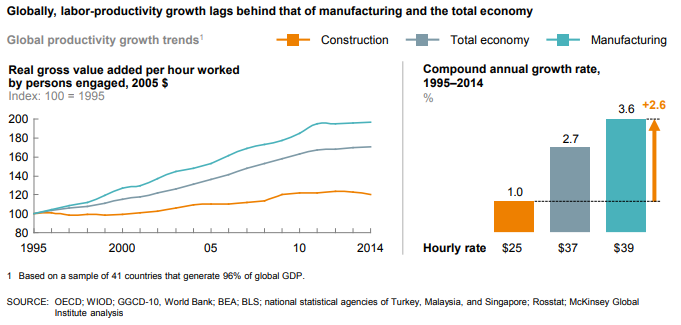
In collaboration with: Beatrice Aliprandi
The construction industry is worth over $10 trillion globally. It accounts for close to 13% of global GDP, with 7% of the world’s working population serving the industry. (1) (2)
However, to date the industry has had little incentive for self-disruption — unlike other industries that have gradually embraced change and digitisation to increase their productivity. This is due to several reasons, which we’ll go into below.
The lack of digitisation in the construction sector means that the annual increase in productivity is, on average, only 1% and EBIT margins are thin around 5% on average for the industry. McKinsey estimates that if the productivity levels were to catch up with the progress made by other sectors over the past 20 years or with the total economy, it could increase the industry’s value added by $1.6 trillion a year (1). As construction is pushed towards digitisation, including as a result of the recent coronavirus outbreak, innovative solutions are emerging across the board: from software to hardware, to remote collaboration tools and drones data capture, VR, new materials and modular homes.

Yes, pretty underwhelming
The key challenges facing the construction industry are:
There are several indicators that demonstrate that the sector is ripening for investment. Firstly, hardware technologies are becoming more affordable and more widely available. For example, the cost of LiDAR scanners (or Laser Scanners — a tool designed to capture detailed measurements for entire rooms, buildings and cities by using multiple scans) has decreased tenfold since 2004, and is now integrated into the new iPad Pro. These technologies, combined with the proliferation of mobile devices within construction sites, allow for a significant amount of potential data-points to be collected, interpreted and turned into actionable insights. (7)
The coronavirus pandemic is accelerating the move to digital. The outbreak has not only taken a financial toll on the industry, as public companies’ stocks have dropped more than the average, but it is also forcing companies to swiftly re-think their operations to allow for remote collaboration. As construction sites all around the world have either shut, reduced their operations or faced disrupted supply chains and restrictions, companies are having to quickly find solutions to return to productivity as early as possible and prepare for the regulations of the post-COVID world.